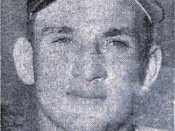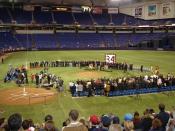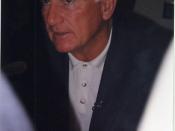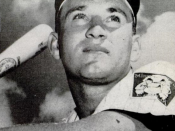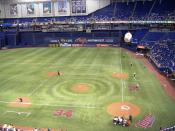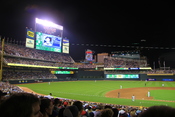Why Contraction, Why the Twins? Nearly all citizens of Minnesota can recall the inspiring games of the 1991 World Series. Kirby Puckett's amazing leaping catch and monumental game winning home run in the eleventh inning of game six cannot be easily forgotten (Dayton 1). Over the years, Twins fans in Minnesota and across the country have obtained lasting baseball memories such as this one, from watching the Minnesota Twins. Because of these memories it seems absurd to consider contracting the Twins from Major League baseball. Bud Selig's attempts to contract the Minnesota Twins from baseball are not acceptable because of the forty years of history they have in Minnesota, the promising season they have recently completed, and the other options which must first be considered by Major League Baseball.
Before rushing into total removal of the Twins, baseball must take into consideration the historic names and moments in baseball history that would not have come about without the Minnesota Twins franchise.
Minnesota Twins history reaches all the way back to October of 1960. This is the year that Calvin Griffin, the teams president, decided to move the Senators from Washington to Minneapolis, Minnesota and rename the team the Minnesota Twins (Twins History 1). Even in their early years, the Twins showed they could be a World Championship caliber team. In 1962, just their second season, the Twins finished the season in second place (1), and in 1965 the Twins won Minnesota it's first pennant (2). This championship team was made up of players such as Jim Lemon, Harmon Killebrew, and Tony Oliva to name a few. Players who are still remembered today by Twins fans and baseball fans alike. Harmon Killebrew, Tony Oliva, Rod Carew, Kirby Puckett, and Kent Hrbek are players who will be remember as long as Mielke 2 there is a major league team in Minnesota, as their jersey's are the only 5 jerseys in Twins history to be retired (Lynch Interview).
The Minnesota Twins have also put their state into the history books in more recent years. They achieved this by winning the 1987 and 1991 World Series. In achieving this, the Twins bcame one of only three teams to have won more than one World Championship in the last twenty years (Lynch Interview). The most recent of these World Series victories was against the Atlanta Braves in 1991, and it proved to be one of the most exciting World Series in League history. This memorable Series started out very promising for the Twins. They beat the Braves in the first two games, and jumped out to an early 2-0 series lead (Twins History 19). However, game three of the series proved to be more challenging as it went into extra-innings and set the tone for the rest of the gut- wrenching series. The Twins lost this third game in the twelve inning (19). Game four of this series was just as disappointing as the one previous; the Twins fell to the Braves due to a ninth inning rally by the Braves to win (19). This loss evened the series 2-2, and a another Twins loss the following night gave the Braves a 3-2 series advantage (19). The only chance the Twins had for clinching the national championship was to win both the six and seventh game. This nearly impossible task set the stage for a heroic Twins comeback.
Game six of this series proved to be the most exciting game of the 1991 series, and quite possibly one of the most exciting games of any World Series. Kirby Puckett was the hero of the game as he carried the Twins on his shoulders with one of the most impressive individual performances of all time. He finished the game 3-4, made a leaping catch against the wall to save a potential run, and hit a game winning home run in the bottom of the eleventh inning to seal a Twins victory (20). With the series tied up 3-3, a dramatic seventh game would unfold. The Twins went on to win this final game and the World Championship with an outstanding pitching performance by Jack Morris (20). Heroic Mielke 3 names like Harmon Killebrew and Kirby Puckett, along with heroic World Series victories are part of Minnesota history. This history is part of the reason why the Twins should not be contracted from Major League Baseball.
In addition to this long-running history, the twins have also proven themselves through their most recent 2001 season which was a preview to the promising seasons the twins have ahead of them (ESPN 3). Not only did the Twins end up with a record of 85- 77 (MLB Standings 1), but they also finished the season fifth in the league and ahead of nine other teams (2). Twins supporters argue that these teams with worse records should be considered for contraction before the Twins. Selig's only response to this argument is that the Twins are not producing enough funds. This point can also be argued by Twins supporters. It is true that Twins do not bring the same revenues that a team such as the Yankees do. However, the Twins expenses do not even compare to that of the Yankees.
Twins President Jerry Bell brought about a good point. He stated, "The Twins were one of the few teams in baseball to show an operating profit" (qtd. in Blum 2). Again Twins supporters are led to wonder: Why are the teams who lost money from operating not being considered for contraction before the Twins? It is evident, that the Twins have a strong case for not being contracted. It is also very clear that baseball commissioner Bud Selig must at the very least, consider other options before contracting the Minnesota Twins.
As you have seen, before baseball goes through with the contraction of the Minnesota Twins, they need to carefully and thoroughly consider the other options which are available. Jesse Ventura spoke to top lawmakers in St. Paul on the topic of contraction and he said, "What I'm going to bring to the forefront is that baseball, before they make a rash decision to eliminate teams, should step back, take a deep breath and Mielke 4 take a year and really think about the decisions that they are making and what the repercussions would be." (qtd. in ESPN 2). One of the options (which is Jesse Ventura's main argument) is for Major League Baseball do adopt a salary cap policy. The National Basketball Association, National Hockey League, and the National Football League have all implemented this type of policy and in all three cases it has been proven as being very useful. This type law is implemented to stop what is proposed to happen. The main purpose of a salary cap is to protect smaller market teams, such as the Twins, from getting forced out of the league by larger market teams, such as the Yankees. A salary cap would stop a team like the Yankees from getting every big market player and allow teams like the Twins to afford some of these superstars. If Minnesota were to get a "big name player" like Derek Jeter it would increase fan support and revenues. It is clear that a salary cap is one of the options that Major League Baseball officials must consider before contracting the Minnesota Twins from the League.
Contraction is clearly not the correct decision for Major League Baseball to make for the future of the Twins. The Twins are part of Minnesota history as they have given Minnesota it's only two National Championships in any sport, and they have given Minnesota legends such as Harmon Killebrew, Tony Oliva, Rod Carew, Kent Hrbek, and Kirby Puckett. Choosing to contract the Twins would also be wrong because of the promising 2001 season they completed. Finally, other options must be thought through before a permanent removal of the Twins is put into effect.
